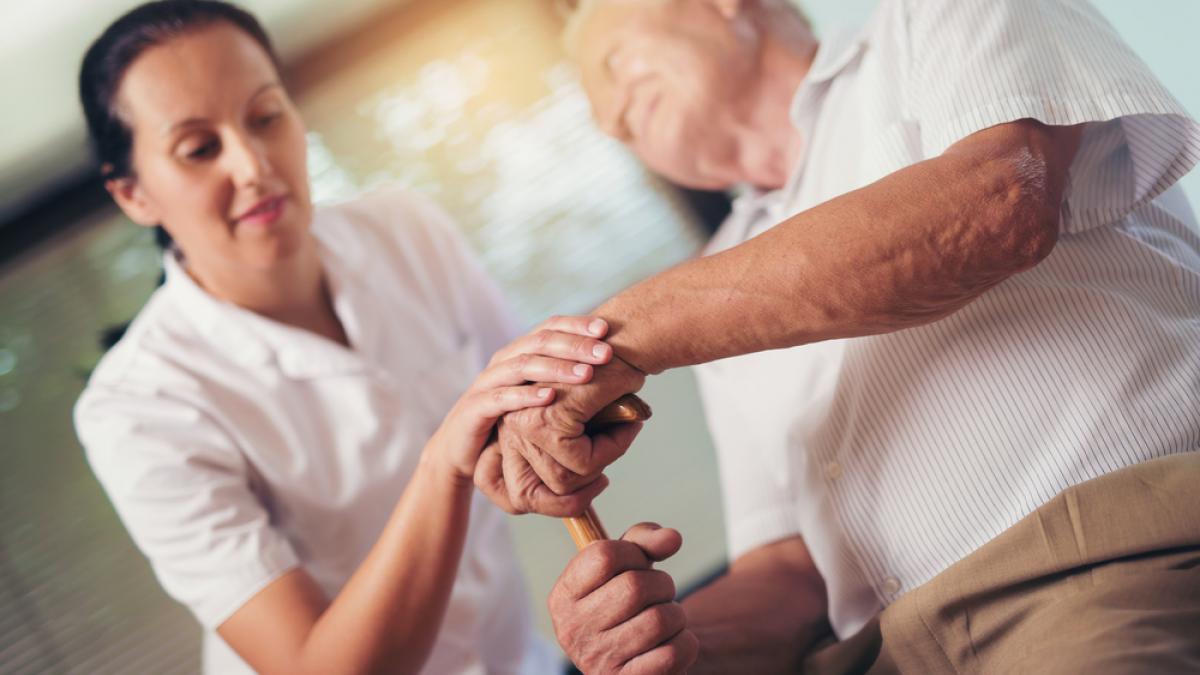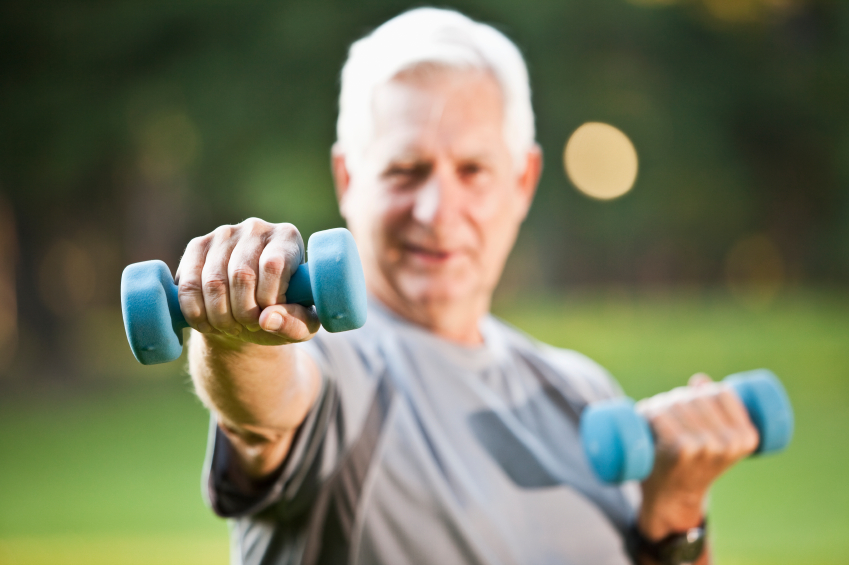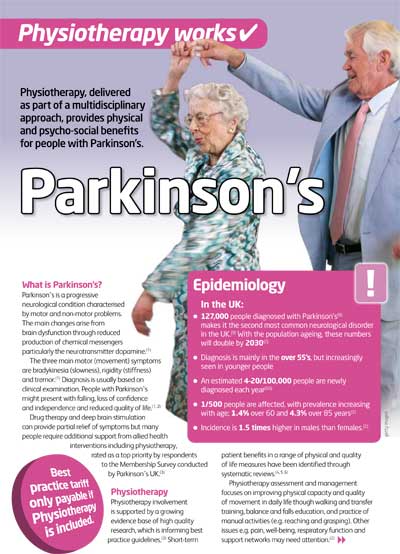Parkinson's Disease affects around 127,000 people in the UK – one in 500. On average, symptoms start at around the age of 60.
On this page:
What is Parkinson’s?
Parkinson's is a neurological condition in which the brain function becomes gradually more impaired. The main cause is thought to be a loss of the chemical called dopamine that helps to regulate the body's movements.
The main motor (movement) symptoms are bradykinesia (slow movements), tremor (involuntary shaking of parts of the body) and rigidity (experienced as muscle stiffness). Symptoms that aren't specially related to your movement can include disturbed sleep, altered mood, changes to the way that you process thoughts and to your speech and memory, as well as to some physiological processes such as swallowing.
Diagnosis can be difficult because of the wide variety of symptoms, but is usually based upon the bradykinesia and any of the other symptoms, on the results of brain scans and sometimes by seeing how the person responds to drug treatment. In some cases, an individual may have just one or some of the symptoms and so is treated as having Parkinson’s – this is sometimes referred to as Parkinsonism.

What causes Parkinson’s?
The cause of the main type of Parkinson’s (called idiopathic) isn't known, but most experts believe that both genetic and environmental factors are involved. Other types of Parkinsonism can be caused by a series of mini strokes, by certain drugs or by trauma.
How can physiotherapy help people with Parkinson's?
Physiotherapy plays a vital role in supporting people with Parkinson's to review their situation, make choices about how their condition is managed, draw up their priorities and address the challenges they face.
What will happen when I see a physiotherapist?
Your physiotherapist will start by assessing how the condition is affecting you, whether you are newly diagnosed or have been diagnosed for some time.
They will carry out a full assessment of what you can do and discuss with you your goals and possibilities. This might include looking at your posture and your ability to reach and grasp objects and to change positions; for example, turning in bed, getting up from a chair and walking. Your physiotherapist will also look at your general physical activity and endurance. You may be asked to wear shorts and a t-shirt during the consultation so that your movement can be properly assessed.
Physiotherapists usually work as part of a team of health and social care professionals who will help you plan how to look after yourself and best manage the life you would like to lead. This can involve giving you information about Parkinson’s and answering your questions about what you are experiencing and what the future may hold. They will discuss your priorities with you and how you plan to manage your condition; offer advice based on your individual needs, which may include how to prevent falls; exercises to maintain your balance, strength and flexibility, and techniques to help with walking and general fitness.
- In the early stages, you may want to focus on keeping fit, active and healthy, and to minimise the impact that Parkinson’s has on your life. Your physiotherapist can support you by helping you to identify which activities to take up. The emphasis is on encouraging you to keep moving.
- If you start to experience problems with your movement, contact your physiotherapist. They can problem-solve with you, suggest how you can maintain your physical activity, consider what you need when you are out and about, and teach you and your family and friends strategies to help you move better. The emphasis is on helping you to stay active and safe.
- As you get older, and as the condition progresses, some of the symptoms of Parkinson’s can have a bigger impact on your day-to-day life. Your physiotherapist will support you in making decisions about how you cope with these changes. Again, the emphasis is on helping you and your support network to make decisions about the best way to keep you active and safe.
How can I help myself?
You can do most by concentrating on your overall fitness and health, particularly through exercise and diet.
Physical activity is important for strengthening your muscles, improving your mobility and keeping fit. It can also help you to feel on top of things: a regular exercise routine can reduce stress, anxiety and low mood. Evidence also shows that if people with Parkinson's do enough exercise, their nervous system becomes more efficient at using dopamine (the chemical that is reduced in people with Parkinson's), helping them to remain physically and mentally active for longer.
Joining a gym that offers a flexible exercise programme, or a local self-care group, or a course to help cope with Parkinson's is a good way to get out of the house, find new friends and put in place an important strategy for managing some of the symptoms. Ask your healthcare professional about what is available locally.
Weight fluctuations are common in Parkinson's as some foods can affect how your medication is absorbed. It's important to maintain a balanced, nutritious diet, but you may need to adjust the time you eat and the time you take your medications. Parkinson's UK has detailed advice on eating well and also about the medications you may be prescribed.
Top tips:
- You will benefit most from seeing a specialist neurological physiotherapist as early as possible, once your symptoms have been identified and you have been diagnosed. They can help you to stay active and manage your condition
- Arrange to see your physiotherapist if you experience new physical symptoms that affect your mobility. Try to remain positive and concentrate on the activities that you can do
- Find physical activities that you enjoy and do them daily. If you are not used to exercise, use walking as a way to help with balance, stamina and confidence, as well as getting you from A to B
- Resistance training will help keep your muscles in shape for activities that require strength; for example, strength in your legs to climb stairs and walk up and down hills, and in your arms to carry items such as shopping bags.
- Maintaining a good posture will help with your balance and general movement as well as your breathing, voice and swallowing. Monitor your posture and ask your physiotherapist to show you some flexibility stretches to add to your exercise routine.
- Some Parkinson’s UK local groups have group physiotherapy sessions: ask your local group for details and join in. Exercising in company and socialising with friends is good for us all!
Guidance and evidence for physiotherapy
Links and further information
- Case study: how physiotherapy has helped Albert Bursill who at 74 was diagnosed as being in the early stages of Parkinson’s disease
- Parkinson’s UK
- NHS Choices
- Age UK
Disclaimer
The content on this page is provided for general information purposes only and is not meant to replace a physiotherapy or medical consultation. The CSP is not responsible for the content of any external sites, nor should selection be seen as an endorsement of them.





































